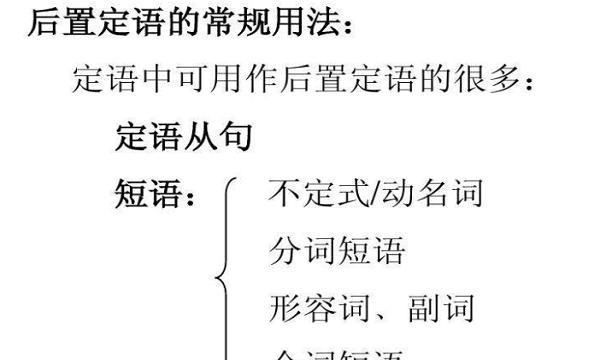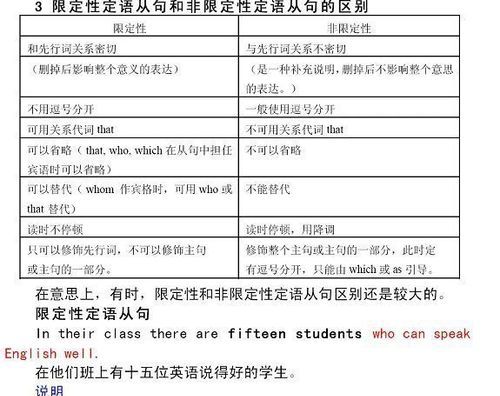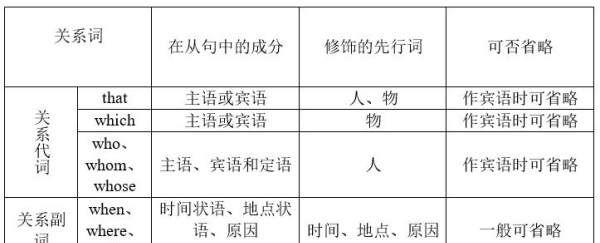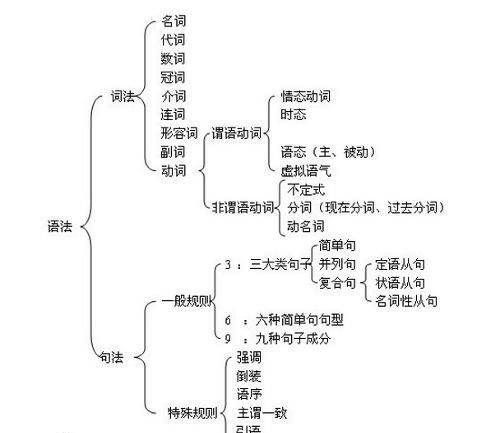本文目录
定语从句的例子
定语从句的例子如下:
1、She'd like to offer money to the students who need it to continue his or her study.
她想为那些需要钱的学生提供帮助。
2、My parents used all that they had to get a new car for me.
我父母用尽了他们所有的钱为我买了一辆新车。
3、Do you think the reason which he gave us is reasonable?
你认为他给我们的理由合理吗?

4、The house where he lives is not far from here.
他住的房子离这里不远。
5、I still remember the research center whose equipment is very modern.
我还记得那个设备非常现代化的研究中心。
6、He will never forget the year when he was admitted to a key university.
他永远不会忘记他被一所重点大学录取的那一年。

7、We get to know the reason why he was forced to give up his work.
我们了解了他被迫放弃工作的原因。
8、The Chinese knots ,which I made by myself with red silk thread and other material, look really beautiful in the shape of diamond.
我自己用红色丝线和其他材料制作的中国结,看起来真的很漂亮,呈菱形。
英语定语从句例子
定语从句,一个简单句跟在一名词或代词后(先行词)进行修饰限定,就叫做定语从句。
英语定语从句例子一
1.The Chinese knots ,which I made by myself with red silk thread and other material, look really beautiful in the shape of diamond. (2013年广西卷)
2. I will organize some campus activities, like “English Evening”, a platform where students can show their English (2013年天津卷)
3.I read the announcement of the summer camp that you have posted on the Internet and I am interested in it. (2012全国卷)
4. In the English corner, I meet many friends, who share the same interest with me. (2012·全国卷Ⅱ)
5. My physics teacher is my role model, whose influence on me had a lot to do with my decision.(2012安徽卷)
6. To avoid such conflicts, we should be kind to one another, which is essential to enjoy a harmonious life. (2012江苏)
7. As we know, books are the source of knowledge. (2012·湖北)
8. Dear friends , please actively take part in after-class activities , which will not only make your school life colorful , but also improve your learning.(2011四川卷)
9. I have taken with me the two books (that) you asked me to return to the City Library. (2009全国I)
10.The reason why we have to grow trees is that they supply us fresh air.
11. I always miss the days when we were on the summer camp last year.
12. It's time to recall those beautiful days we spend together. (2007年湖南卷)
英语定语从句例子二
1.He,who knows nothing but pretends to know
everything,is indeed a good-for-nothing.
不懂装懂,永世饭桶.
2.He that is ill to himself will be good to nobody.
人不自爱,焉能爱人?
3.He laughs best who laughs last.
谁笑在最后,谁笑得最好.
4.He who makes no mistakes makes nothing.
从不犯错误的人一事无成.
5.He that can read and meditate will not find
his evenings long or life tedious.
会读书思索的人不会感到长夜无聊或生活乏味.
6.He that gains time gains all things.
谁赢得时间,谁就赢得一切.
7.He is the best general who makes the fewest
mistakes.—Hamilton
错误犯得最少的将军就是最好的将军.——汉密尔顿
8.He who nothing questions,nothing learns.
什么也不问的人什么也学不到.
9.He that is master of himself will soon be
master of others.
能自制者方能制人.
10.He that travels far knows much.
行万里者,见多识广.
11.He that cannot ask cannot live.
万事不求人,哪里能生存?
12.A friend is someone who knows all about
you and still loves you.
英语定语从句例子三
朋友就是这样的人——他了解你的一切而仍然喜欢你.
【 并列式定语从句 】 (1) The owner of the housewhosewife is dead,whoseson works in New Yorkandwhowants to go and live with him, is willing to sell the house at a low price. 这幢房子主人的妻子已过世,儿子在纽约工作,他想搬去和儿子一起生活,所以愿意以低价出售此房。
(2) Mr. Smith,whohas a good command of French and Englishbutwhodoesn’t know Chinese, finds it difficult to study Chinese literature. 史密斯先生精通法语和英语,但对中文则一无所知,所以他发现研究中国文学很困难。
(3) This is the house inwhichthe famous man lived,whichyou visited 10 years agoandwhichbecomes a museum now. 这就是那位名人居住过的房子,10年前你参观过,现在成了博物馆。
【 复合式定语从句 】 (1) She had a bookwhichshe believed was bought by her father at a dear price. 她有一本父亲送她的书,她相信是父亲花了大价钱专门买来送她的。
(2) She has an adopted childwhoshe says was an orphan. 她有一个养子,据她所言,这个孩子以前是个孤儿。
(3) Can you mention anyonethatwe know who is so talented as he? 在我们认识的人中,你说还有谁像他一样有才华?
(4) She is the only girlthatI knowwhocan play the guitar. 她是我所认识的唯一会弹吉他的.女孩。
(5) Is there anything else (that) you'd like (that) you don't see on the shelves? 有没有别的你喜欢的东西,现在架子上还没有?
▲此外,你说的 high in fat,意为“在脂肪方面含量高”。例如:
Ice cream is high in fat and sugar. 冰激凌的脂肪和糖分含量很高。
A diet high in fat may lead to obesity.一个人的饮食含脂肪过多会导致肥胖。
Eating too much food which is high in fat and sugar will result in heart illness.吃过多高脂肪和高糖类的食物会导致心脏疾病。

6大从句从句
英语中六大从句用法总结
1.定语从句
定语从句所修饰的先行词可以是名词或代词,也可以是一个句子。定语从句通常位于先行词之后,由关系代词或关系副词引导。

*限制性定语从句
限制性定语从句修饰先行词,对先行词起修饰作用,紧接先行词之后,无逗号,若省去,原句意思不完整。引导定语从句的关系代词有who,whom,whose,which,that等。who,whom,whose用于指人,whose有时也可指物,相当于of which;which用于指物;that既可指人也可指物,但只用于限制性定语从句中。关系代词除了引导定语从句,替代先行词外,还在从句中担任主语、宾语、定语等。
The computers and cables which make up the Internet are owned by people and organizations.
Those who live alone or who are sick may have trouble in getting close to other people.
The girl whose parents died in an accident is living with her grandmother.
1)当先行词是all,anything,everything,something,nothing等不定代词或先行词前有first,last,any,few,much,some,no,only以及形容词最高级修饰时,只能用关系代词that引导从句。
That is all that I've heard from him.
He's the first person that I'm going to interview this afternoon.
2)关系代词的省略
在从句中作宾语的关系代词常可省略。关系代词紧跟介词,作介词宾语时不可用that,只可用which或whom引导从句,并且不可省略,但当介词位于宾语从句句末时,作为介词宾语的关系代词仍可用that,也可省略。
This is one of those things with which we have to put up.
This is one of those things (which\that) we have to put up with.
3)引导定语从句的关系副词有when,where,why等。关系副词在从句中作状语,意义上相当于一个“介词+which”的结构。
Even in comic books where(=in which) there are no words,the stories are fully expressed through the drawings.
No one knows the reason why(=for which) he was so angry that day.
*非限制性定语从句
非限制性定语从句既可修饰先行词,也可修饰整个主句,起补充说明作用,与主句之间有逗号隔开,若省去,原句意思不受影响。不可用that引导非限制性定语从句。关系词不可省略。
Every object has a gravitational pull,which is rather like magnetism.
*“介词+which\whom\whose”引导的定语从句
“介词+which\whom\whose”可引导限制性定语从句,也可引导非限制性定语从句,该结构中介词的选择取决于从句谓语动词的固定搭配,或先行词的习惯搭配。
This is the computer on which he spent all his savings
It is written by a person with whom we are all familiar.
*as引导的定语从句
as引导的定语从句主要用于“such...as”及“the same...as”的结构中,代替先行词是人或物的名词。as引导非限制性定语从句时,代替整个主句,从句可位于主句之前、之后或中间。
These are not such problems as can be easily solved.(as代替先行词problems)
As is mentioned above,no single company or group can control what happens on the Internet.(as代替主语)
2.主语从句
1)主语从句可直接位于主语的位置,如果从句较长,谓语又较短,可用it作形式主语,而将从句放在句末。常见的句型有:
*It is a fact\a pity\a question\good news that...
*It seems\appears\happened\has turned out that...
*It is clear\important\likely\possible that...
*It is said\reported\estimated\has been proved that...
It is said that comic books create a connection between people of the same generation.
It seems that the performance is very useful.
2)what引导的主语从句表示“...的东西时”,一般不用it作形式主语。
What we lack is experience.
3)what,who,when,why,whether等词含有各自的疑问意义,但它们引导的主语从句,都用陈述语序。
How the plan is to be carried out should be discussed again.
I did know why I felt like crying.
3.宾语从句
1)宾语从句可位于及物动词、介词和某些形容词后。连词that常可省略。介词后一般接疑问词引导的宾语从句。in that(因为),except that(除了),but that(只是)已构成固定搭配,其他介词后一般不接that引导的宾语从句。
*I promised that I would change the situation.
*All this is different from what American young people would say about friendship.
*He is certain that watching so much television is not good for children.
*This article is well-written except that it is a bit too long.
2)关于宾语从句连词的选择:
③ 若从句来源于一个特殊疑问句,则连词就是疑问词(如 what,who,where,when等)
*They believe that the computer will finally take the place of human beings.(他们相信计算机终将代替人类。) (从句本来就是陈述句)
* I wonder whether I should say something for him to the headmaster. (我不知道是不是该为他在校长跟前说点什么。) (从句来源于一般问句Shall I say something for him to the headmaster?)
*He asked me where he could get such medicine. (他问我在哪儿能搞到那样的药。) (从句来源于特殊问句Where can he get such medicine? )
3)宾语从句后如有宾补,要用形式宾语it来代替,而把宾语从句移至宾补之后。
He has made it clear that he would not change his mind.
4)在think,believe,suppose,expect等动词后的宾语从句中,如果谓语是否定的,一般将否定词移至主句谓语上,宾语从句则变成肯定形式。
He didn't think that the money was well spent.
4.表语从句
在句子中作连系动词的表语的从句,它位于主句中的系动词之后。表语从句出现在结构为“主语+系动词+表语从句”的句子中。表语从句除可用that,what,when,why,whether,how等引导外,还可由because,as if(though)等引导。that常可省略。如主句主语为reason,只能用that引导表语从句,不可用because.
*Perhaps the most important thing to remember is that there is no one common type of life in America.
*The reason why so many people died there is that there were not enough food supplies.
*It looks as if successful international cultural communication will make the world smaller.
5.同位语从句
同位语从句用于对前面出现的名词作进一步说明,一般用连词that引导,由于先行名词的意义不同,也可用whether,who,when,where,what,why,how等引导。常见的先行词有fact,idea,belief,news,hope,conclusion,evidence,suggestion,order,problem,report,decision.有时由于谓语较短,将同位语从句位于谓语之后。
She finally made the decision that she would join the fashion show.
I had no idea how many books I could borrow at a time.
The news came that their team had won the championship.
6.状语从句
*时间状语从句
引导时间状语从句的从属连词和词组有:
1)when,whenever,while,as,after,before,since,till,until,once等。
We have learnt quite a lot about it since we came here.
2)as soon as,hardly(scarcely)...when,no sooner...than,each(every) time,the moment,immediately(that)等。
As soon as I sent an e-mail message,I received positive responses.
The moment he heard the good news,he jumped with joy.
*地点状语从句
引导地点状语从句的连词是where,wherever.
Wherever she went,she took her little daughter with her.
*原因、结果和目的状语从句
1)引导原因状语从句的从属连词有:because,as,since,now(that),seeing that,considering that,in that等。
Considering that he is a freshman,we must say he is doing well.
2)引导结果状语从句的连词有:so...that,such...that
,so that,that,so等。
Mickey Mouse is so attractive that the children are reluctant to leave.
3)引导目的状语从句的连词有:so that,in order that,for fear that,lest等,从句常使用may,might,can,could,would等情态动词。
We got up early this morning so that we could catch the first bus to the railway station.
*条件和让步状语从句
1)引导条件状语从句的连词和词组有if,unless,as(so) long as,on condition that,in case,provided(providing) that,supposing等。
As long as you have the right equipment,you can use a telephone line to transmit computer data.
2)引导让步状语从句的连词和词组有though,although,whether,even though,even if,no matter what(when,how...),whatever(whenever,wherever,however....)等。though,even if等引导状语从句可转换成含有as的部分倒装结构,具有强调意义。其结构为“形容词(副词、动词、名词)+as+主语+谓语”。
No matter what you may say,I would not change my mind.
Young as he is,he is quite experienced in this work.(=though he is young)
Child as he is,he can speak English fluently.(=though he is a child)
*方式状语从句
引导方式状语从句的连词有as,just as,as if,as though等。as if,as though引导的状语从句中,谓语动词常用虚拟语气,表示与事实相反。
The young man made the experiment just as the teacher had taught him.
Everything went on as usual as if nothing had happened.
英语中考必考语法知识点归纳
解释如下

定语从句,一个句子跟在一名词或代词(先行词)后进行修饰限定,就叫做定语从句。通俗来讲,从句在整个句子中做定语,这个从句就叫做定语从句。从句在主句中充当定语成分。 [1] 被修饰的词叫先行词。定语从句不同于单词作定语的情况,它通常只能放在被修饰的词(即先行词)之后。
定语从句公式
定语从句=先行词+关系词+从句
先行词
指被定语从句修饰的名词、代词。
一般先行词出现在定语从句的前面。
关系词
关系词常有3个作用:
①连接作用,连接主句和定语从句。
②指代先行词。
③在定语从句中担当成分。
注:关系代词有主语、宾语、定语之分。一般who做主语或其宾格形式的whom做宾语(whom作宾语时可省略),whose作为定语(whose不可省略)。关系代词在从句中作主语,宾语,定语等,关系副词在从句中作地点状语(where),时间状语(when),原因状语(why)。
定语
定语用来限定、修饰名词或代词,是对名词或代词起修饰、限定作用的词、短语(动词不定式短语、分词短语)汉语中常用“……的”表示。主要由形容词担任,此外,名词、代词、数词、分词、副词、不定式以及介词短语也可以来担任,也可以由一个句子来担任。单词作定语时通常放在它所修饰的词之前,作前置定语。短语、从句作定语时则放在所修饰的词之后,作后置定语。
被定语从句修饰的名词、代词称为先行词。如“the girl”,“the book”
如:She is the girl who likes singing. 她就是那个喜欢唱歌的女孩。
这就是一个定语从句。
以上就是关于英语定语从句例子以及其成分,定语从句的例子的全部内容,以及英语定语从句例子以及其成分 的相关内容,希望能够帮到您。

